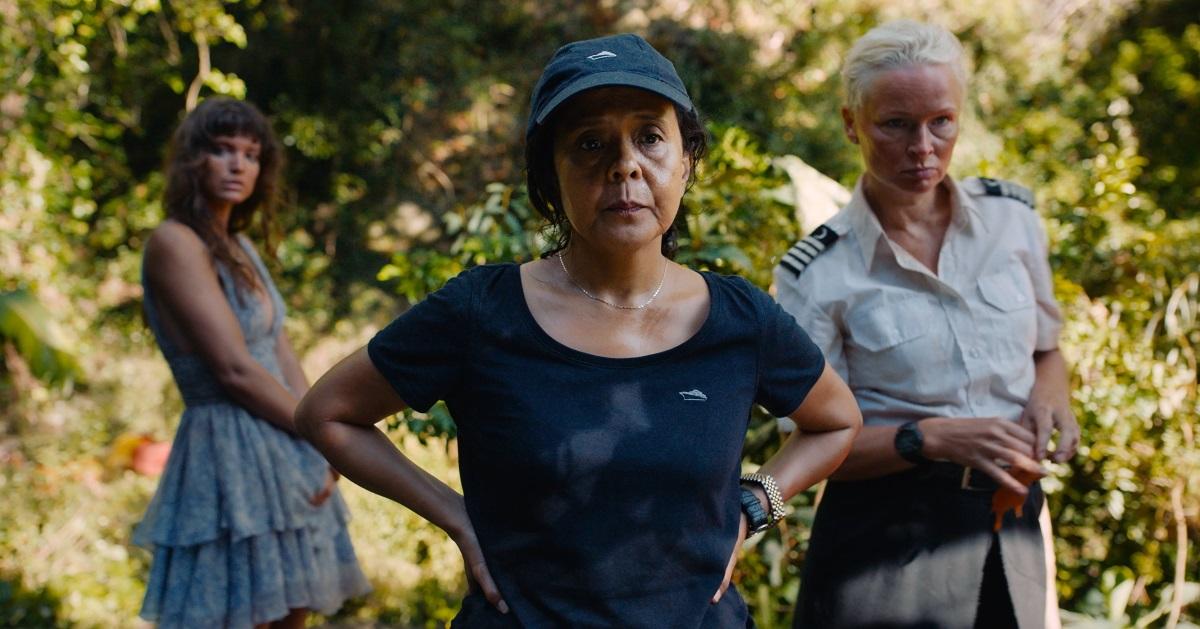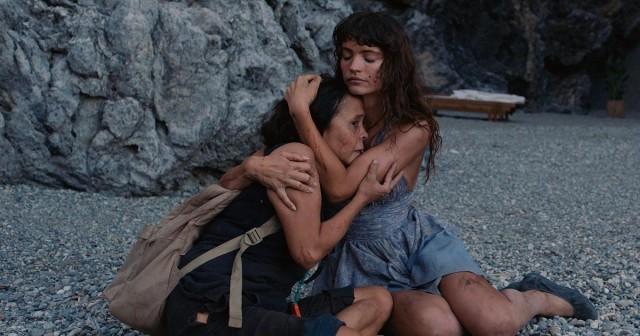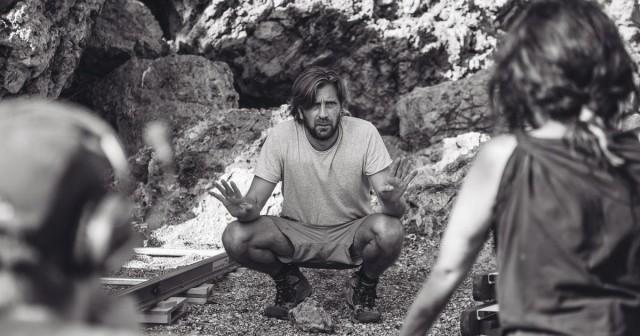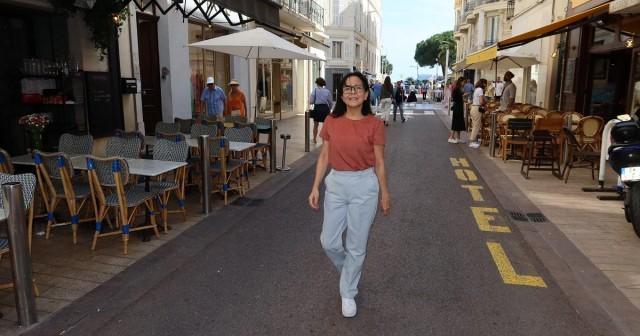Dolly de Leon on her scene-stealing performance, first bed scene in Cannes entry 'Triangle of Sadness'

We were pleasantly surprised to see Filipina actress Dolly de Leon in the satirical film "Triangle of Sadness," written and directed by former Palme d'Or award-winning director Ruben Ostlund ("The Square").
Portraying Abigail, a hardworking toilet manager-turned-feisty island leader, de Leon was a scene-stealer in the movie that also had Woody Harrelson (Captain Thomas Smith), Harris Dickinson (Carl) and Charlbi Dean (Yaya) in the cast.
The dark comedy follows a fashion model celebrity couple (Carl and Yaya) who are invited on a luxury cruise for the ultra-rich until their ship capsizes and the couple lands in an island with some of the staff and guests who survived.
The internationally co-produced film was filmed in Sweden, Greece, and in the Mediterranean Sea on the Christina O, the yacht formerly owned by Aristotle Onassis and Jackie Kennedy.
The film premiered at the 75th Cannes Film Festival and received an eight-minute standing ovation. It is in competition for the Palme d'Or.
We were able to interview the theater-trained actress de Leon, who has been receiving rave reviews and critical acclaim for her performance. Below are excerpts of our conversation.

Congratulations on your performance. How did you land the Abigail role? Did you audition by Zoom, considering the pandemic? Was there a final in person audition with director Ruben Östlund?
They actually flew to the Philippines. Pauline Hansson flew to the Philippines. She's the casting director. They held auditions there for 11 days. I auditioned. It was a live, face-to-face audition because this was pre-pandemic. This was in mid-2018. They made me do three scenes, which were lifted from the script, from the actual script. The scenes are in the film. After that, I believe that Pauline would send clips of the auditionees that she chose. This would be sent to Ruben.
From there, Ruben would organize Skype meetings with us individually, where he would talk to us. He didn't make me act anymore. I didn't audition for him anymore. We just had a conversation for one hour. We talked about the character, Abigail. We talked about what my take on her is. I gave him my impression, my personal impression, of her and how I see the character should be portrayed, her background and things like that. We talked about his directing process, how he does it, how he works. He got into detail with that. It was really a meeting on checking how I would understand him, because of the language barrier, because he's Swedish. Maybe he assumed because I'm Filipino, I only speak Tagalog. There was no final audition with him. It was really just that, through Skype.
How did you develop your character, Abigail, from cleaning lady to captain? Do you think Abigail would want to go after a regular life?
I simply trusted the script, that's it. It's just trusting the material, because the material was very well-written. It was very well-written by Ruben. As an actor, you just really have the material to rely on and depend on and trust. It took care of itself, basically. The trajectory of Abigail's character took care of itself based on the script.
Abigail would definitely not want to go back to her regular life because in her regular life, she's invisible. Her efforts are not really appreciated. She's an underdog and women who are powerful because Abigail has that innate power in her. She's had it all along, but it's never really surfaced. Maybe it's surfaced in a way that she became a toilet manager, which is an honorable job to be in charge of that particular department of a yacht. But to her, she's also accepted that that's part of her life and she's okay with that. She's accepted it and she's just coasting along, going with the flow of life and she's okay with it.
But then when she gets a taste of this real power, this really palpable power that gives her more than what she's ever dreamed of in her entire life. She wants to live that life and she wants to stay there for as long as she can, for as long as she can exploit it. Definitely, she does not want to go back to her regular life. She has it good.
In what ways did your character resonate with you? How much do you identify with Abigail?
I identify with Abigail a lot. We have a lot of similarities, although there are a lot of differences, but I do identify with her. Her sense of power resonates with me because I like to believe that I'm a powerful woman, even if most of the time I feel weak. That's the similarity that Abigail and I have.
Most of the time she feels weak, powerless and helpless because of circumstances in her life and how she has to do things in order to survive the world. I feel the same way. I'm a mother. I have four children and the struggle is real with me having to go out, work and film, leaving my kids at home. I've also experienced being away from home for a long period of time. I know how it feels to be Abigail in that sense of being away from home, away from your loved ones, living in a strange land, speaking a language that is not your own. Sometimes I would find myself translating my own lines.
I find myself interpreting or translating my own lines because I forget that I need to speak in English so that everyone will understand me. In many ways, we also share the same frustration with the everyday things that happen in life, in being a woman, in gender equality.
It's really not easy being a woman these days. But we are getting there. We are on the road to gender equality. However, in my generation, I don't really feel it yet 100 percent. With Abigail, maybe she's experienced discrimination because of her race, because of the culture that she comes from. I didn't feel that personally because we worked with a great cast and the great crew. They were wonderful people. The Swedish crew, the Greek crew, the actors, they were all warm, wonderful people.
I felt very welcome, but that's because the film industry, that's a very nourishing and nurturing atmosphere. Everybody is there to collaborate and help each other and support each other. I have yet to work in a film set where you're being discriminated upon.
Maybe when I was younger, I experienced how people discriminate against you because you're not known. You're not famous. You're playing a big part. When we would come to the set of a film or a shoot, they put us in a tent with all the other stars. I would always feel so small, insignificant and insecure because here are these big stars and some of them are pretty snooty. I'm not going to lie. Some of them are snooty. They have this air with them going like, "I know. I'm all that. I'm the s***." They are standoffish. They do not know how to say hello or hi. So definitely, I can relate with Abigail in many ways.

What was your experience like working with Östlund?
Ruben is an intense director. He is so passionate about his craft, and he knows exactly how he wants a film to look. But at the same time, he's also very open to your perspective. He's open to a collaboration with the actor, and he always goes for being real. That's what I appreciate the most about him. It's about being real. He's not the type who will say, "I want your acting to be edgy." He respects the actor enough that you will deliver what you feel is right for the character. He's a dream to work with. Tiring, because of the many takes, but he makes the atmosphere of the set fun and light. He encourages the crew to applaud after every take. He would encourage everyone, "Stop what you're doing. You have to watch; you have to watch." When he says action, you have to be watching the actors in the monitor. For him, it is disrespectful if you do not watch. You have to show your support to the actors.
He also has a big golden gong. We can come up with a better performance through that. After he says action, and counts five, four, three, two, action. He will strike the golden gong. You cannot act yet if he hasn't hit the gong.
You have to wait for the sound of the gong to fade away, and then you start acting. Some of the actors didn't like it, but personally, I loved it, because it gave me a good kick or push start. It was like a signal for me to go, game on. That whole process between the time that the gong sounds until it fades, I'm preparing myself already for the scene. I loved it. I loved working with him.
How was it working with actors Harris Dickinson (Carl) and Charlbi Dean (Yaya)?
They're wonderful people. They're very cool. Whenever we're in the scene together, they have no egos. We're literally playing when we're in front of the camera. I've heard that the chemistry between us actors was very good. That's because we really cultivated friendships when we were there. We were all on the same mindset that we wanted to live the characters while we were being filmed, and really espouse their desires and their dreams. It was good to work with both of them.
How did you and Harris prepare to make both of you comfortable with each other for your bed scene?
We would hang out during our rest days, especially when we knew that it was time for us to shoot the love boat scene. We spent some time together the two nights before. The night before, we rehearsed it. We got to know each other so that we can be very comfortable with each other. We talked about our limitations as actors, because it's a very delicate scene. He told me what his limitations were. I told him what my limitations were. So it was, when we got into set, we already, more or less, had each other's safety and welfare in mind, which helped a lot with the nerves, lessening the nerves.
However, I was still a little nervous because it was my first major bed scene. Harris was a gentleman. He would always ask, "Are you okay? Is this fine?" Things like that. We were taking care of each other. So that's the great thing about that.
Where did you film those island scenes?
We shot the island scenes in Greece in Chiliadou. It's an island about two hours away from Athens.
Any fun, memorable, or challenging experience that you can share while doing the movie?
I have to think of that. Oh, there was a lot of fun and memorable. The whole thing was challenging already to begin with. It was really challenging. Working in a foreign country with these foreign actors was really intimidating at first.
The standard level of the way they work there is very different from how we do it in the Philippines. I am not saying that the standard in the Philippines is low. I am just saying that their standard is different.
I went there with that in mind, they made it easy for all of us, because it was a loving set. We all looked out for each other. We took care of each other.
For me, the most fun was watching Henrik Dorsin do his whole monologue about the donkey. His character, Jorma, made us draw donkeys, our own version of donkeys. Henrik is a standup comedian and a theater actor in Sweden. We were just laughing all the time with all his adlibs.
In real life, can you also fish with your bare hands, start a fire from scratch, or survive on an island?
No, I cannot fish with my bare hands. Absolutely not. I wish I could. But I can start a fire from scratch. Yes. Because when you're a starving artist, you have to find other ways of making money. So, I would do team building programs, facilitate team building programs. We had a course like that, where we would teach our participants how to start the fire. Survive on an island? I think I can survive on an island. First of all, I love nature. I love the outdoors and I watch a lot of Bear Grylls, so I think I definitely would survive on an island. I'd hate the insects, but I think I'd be okay.
Have you ever had a horrible cruise experience?
I have never been on a cruise. I've never really wished to be on a cruise, because I think that those cruise things, not to put cruise liners down, but that's the best place to commit a crime, because you can just throw someone overboard, and no one will ever know that you did it, because their corpse is washed away at sea. Without the body, you don't have evidence, and there's no crime. I hear that they also have buffets all day and the food is out all day. Just the thought that you're eating all day, it's just, ugh. No, I don't think so.
Can you tell us more about your Philippine roots?
I was born and raised in the Philippines in Manila. I come from a huge family. My great-grandfather was an opera singer, so I guess that's where I got this underlying urge to perform. I have four siblings and I'm the youngest. One of my brothers live in the States and my sister and my other brother are in the Philippines in Manila. I'm still based in Manila and that's really my home, and that's where my children live.
Manila is home for me. I never grew up anywhere else. My father's parents come from Ilocos, but both my parents were also born and raised in Manila. My mother's mom is Ilongga from the Visayas.
You were so natural in your scenes in the movie. Were you a former theater actress? Where did you get your acting training?
Thank you! Thank you so much for that. I am a theater actor. That is my first love. That's my first foray into this world. I studied in UP Diliman as a theater arts major, so I started with plays and eventually moved into soap operas.
I would do bit roles there until eventually I got into film and did more soaps would still do plays in between. I really got my acting training from the late Tony Mabesa, who is a theater stalwart. He and Professor José Estrella, who basically honed me as a theater actor. I got my training from that and Augie Juliano also, who trained me in voice and movement. Cris Vertido, who was also my professor, Ella Luansing, who was also my acting teacher in college. That's where I got my training as a student. But eventually, you're training as an actor really comes in when you work. It's really all about just keep doing it, keep acting and working. That's where the real training comes in, because all the training that we learn in school, that's all theoretical. It only becomes really useful if you're using it in the actual trade.
What's your Cannes experience like so far? Is this your first time at the Cannes Film Festival?

Oh, my gosh. It's wild. It's wild. I want to come back. I want to come back next year. I want to come back every year. It's so much fun. It's a bit crazy.
Yes, it is my first time at the Cannes Film Festival. It's my first time, so, in the beginning I was so overwhelmed. I didn't know what to expect. A good friend who has been here many times told me that Cannes is like one big palengke, (market). I love it. I love how everything is accessible. And yes fun. It's a small city, so you can move around on foot. There's a beach. It's wonderful. I love watching films. So, yeah, I get to do that here, too. And the red carpet, in the beginning, I was intimidated by it, but when I was there, it was so much fun. Oh, my gosh, I love the red carpet so much.
What were your thoughts and emotions as you walked that famed red carpet, with all these other stars and talents?
Yeah! That famed red carpet with all these other stars and talents. In the beginning, I was intimidated. It was really intimidating. The thought that I would be, ugh, dressed up, and posing, and doing that, and putting on your face and your eyebrows, and posing. I'm just going to be myself. I'm not going to do any of that model shit. Nothing against models. I think they're great. Shelby's a model and I love her, but I went in there and just be myself. That's what I did, and I had fun! It was great. Direk Eric Matti, who's also a very good friend of mine and he's such a supportive director, told me a tip that I'll never forget. He said, "When you are there, just clear your mind and enjoy the moment. Before you know it, you are already inside the theater. So, enjoy."
And that's what I did. I was really looking and observing everybody, looking at the photographers, just sucking it all in, just enjoying it and relishing it. The other stars were not there. We were at our own premiere and there were no other stars except for Woody Harrelson, who's such a down-to-earth person. There's nothing show-bizzy about him at all. He's very accessible. He's friendly, cool, and funny. Cool dude.
How did you prepare for your red-carpet appearance? Was what you wore by a Filipino designer?
Yes. I had my outfit made by Ann Cuatico who is my high school batchmate. We went to school together, and I wanted my formal to be special. I didn't want some famous person... Not like I have access to a famous person to design my outfit, but that's how I wanted it to be. I wanted to be Philippine-made, homegrown, and a collaboration.
We talked about how I wanted to look. I wanted the simple look. I didn't want to be too flashy. I wanted to look elegant and simple, and that's what we both came up with. That's how I prepared for my look.
The bag I had with me there is a very special bag. I had a choice between that and another clutch, an evening clutch, but I chose that bag because that was my abuelita's bag, my late grandmother. She played a big part in raising me, so I wanted a piece of her with me on the red carpet. I wanted it to be a personal experience, not some superficial flashy, posey, photography, paparazzi-style of red carpet. She wore it during all her formal occasions when she was young.
Who are the other Filipino directors you have worked with and what have you learned from them?
Erik Matti taught me that I have to come to the set fully prepared. Because he put so much trust on the actor that you have to chip in in a big way with him and be very clear on how you want to do the part and the scene, because he will put that trust on you. He will never dictate to you how you should do the scene. He's not a dictator. He's not a power player. He really believes in collaborating.
I've also worked with Antoinette Jadaone. I learned to come in to be prepared, to be flexible and adaptable, because she can decide to have you do a scene in a different way or change your attack. Sometimes even if she's written the script, even if it's there on paper when you're on set, she may have a different way of doing it when you're on set, because that can change really. Something on paper looks very different on set and you have a clear vision once you're really on set. And I've learned from her that you have to be prepared to be adaptable and to be ready and put all your tools, bring all your tools with you so that if she asks for something, you have to be ready to give it.
I've also worked with Sigrid Andrea Bernardo. With her, it's really all about truth and being truthful. Very similar to Ruben Östlund. You can't trick them. You can't bring out your bag of tricks and expect them to believe you. You have to come up there with your heart on your sleeve and be as truthful as possible and true to the character.
With Lav Diaz, he only does one take. He's the exact opposite of Ruben Östlund. Ruben does several takes. With Lav Diaz, it's one take. So, you better get it right the first time because if you ask for another one, he's not going to give that to you because Lav believes in capturing the moment in its rawest form and he believes that he can get that in the first take. So, you have to be really prepared.
What are your next projects?
So far, I have an independent film. It's called "Lagaslas" and it's going to come out in a new streaming platform that's going to be launched. That's one of the films that will be launched together with the launch of the channel, and that's with Christopher Novabos. I'm looking forward to that. I'm also doing work with Dennis Marasigan who has written and will direct a film for Vivamax. I am looking forward to what else will come next. Can't wait.
—MGP, GMA News




